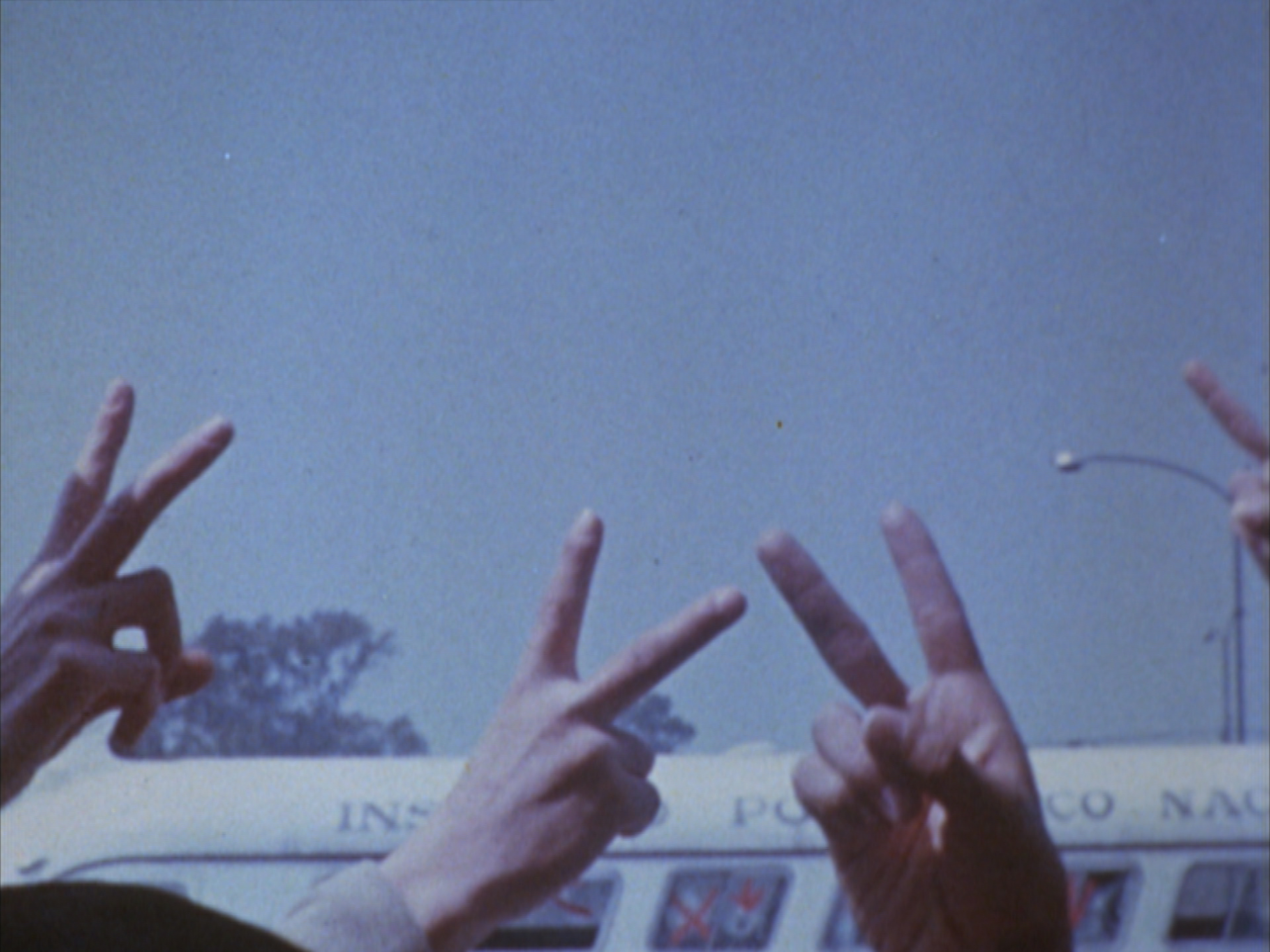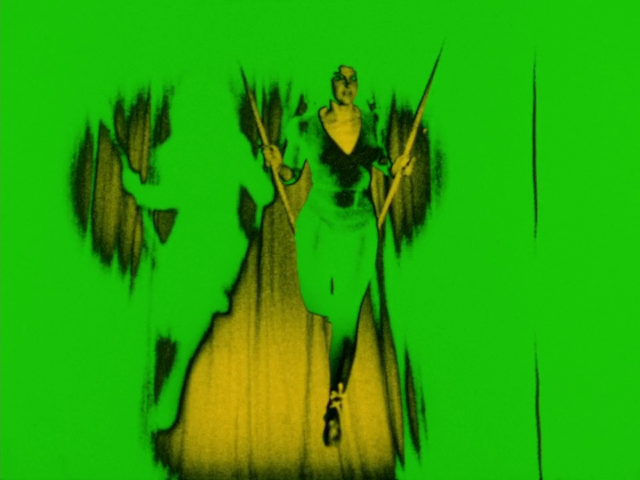The first part of the film contains footage of the first day of school for small children, the Belgian National Holiday, the anti-nuclear protests, the beer festivals in Wieze, the De Scheldeprijs cycling race in Schoten and the IJzerbedevaart in Diksmuide. The second part is the story of a group of young people who, during their “odyssey” through Belgium - described on the basis of the reports in the first part - are jogging towards a certain awareness. However, their wickedly well-considered resistance leads to great stupidity. They are surrounded by the gendarmerie and in a final attempt to do something they sign their own death warrant.
Heel wat Fugitive Cinema-producties golden als filmische vertalingen van de mei ’68-contestatie. Het beste voorbeeld daarvan is De Herts Camera sutra of de bleekgezichten (1973), een militante film die in karakteristieke Fugitive-collagestijl scherpe kritiek uit op de burgerlijke schijnheiligheid van België. Via een montage van reportagebeelden argumenteert De Hert eerst dat bierfeesten, sport, IJzerbedevaarten en nationale defilés het volk zoet houden om de aandacht af te leiden van de echte problemen in België en de wereld, zoals de beknotting door kapitalisme, kerk en staat, de sociale onrechtvaardigheid en de postkoloniale uitbuiting. Het tweede deel van de film is een semi-autobiografisch fictieverhaal over een vergeefs revolterende groep jongeren. De Hert speelt zichzelf, net als zijn toenmalige partner, de links en feministisch geëngageerde Ida Dequeecker, die een grote rol speelde in De Herts ideologische vorming. In dit tweede deel toont zich de zelftwijfel van de revolutionairen. Als de personages een vraag wordt gesteld, hebben ze nauwelijks antwoorden. Er is geen doordachte contestatie, ze handelen eerder vanuit een gevoel, vanuit een onmacht die ze niet kunnen verwoorden. Net zoals de huilende kleuters die aan het begin van de film achtergelaten worden op school, een van de instituten die het maatschappelijk bestel in stand houden.”
Gertjan Willems
“En toen we einde ’69 wonder boven wonder en in een mum van tijd ons eerste langspeelfilmproject bij het ministerie erdoor kregen (alles kan, als de administratie maar meewil), hadden we ons zo eigenzinnig opgesteld, dat er met ons niet meer te praten viel. Een voorstel om wat meer seks in Camera Sutra (onze eerste lange film) te verwerken, werd honend onthaald. We wilden wel om de tien minuten een paar blote borsten laten zien, maar dan ook exact om de tien minuten, welke scène er ook bezig was. Dan moest er iemand zeggen: ‘Hé, die tien minuten zijn om, ik moet mijn forsbollen nog eens laten zien.’
Er was zoveel dat we wilden laten zien met Camera Sutra, dat het een opeenstapeling werd van ideeën en vondsten; zonder een werkelijke structuur. Het scenario bestond uit acht beschreven vellen papier. De rest waren ideeën, krantenartikels, gegevens... Nadien hebben we dan ook maanden (vijftien?) mogen zwoegen om dit alles toch min of meer aan elkaar te rijgen. Daartussen zitten een aantal filmfragmenten, zoals de huilende kinderen, de liefdesscène, de beelden onder Working Class Hero, de Wieze-oktober-feesten, die nog steeds tot de beste van Fugitive behoren. Wat we toen allemaal gefilmd hebben!”
Robbe De Hert
Leo Mees: Camera Sutra heb ik ervaren als een pijnlijk en wanhopig zelfportret. Je speelt niet alleen één van de hoofdrollen, maar de hele film heeft te maken met je eigen verleden, met wat je denkt en met wat je bent. Het is een pijlijk zelfportret geworden, in die zin dat je hier een tamelijk wanhopig beeld ophangt van de overtuiging dat sociaal engagement op zeker ogenblik vraagt naar reële daden en je de onmogelijkheid laat uitschijnen om die effektvol te maken. Nog pijnlijk, in die zin dat Camera Sutra een mislukte film is geworden waar je dan tenslotte toch drie jaar hebt aan zitten werken en waardoor je tenslotte weer de nodige kritiek te verduren krijgt.
Robbe De Hert: Het probleem dat ik heb willen stellen in Camera Sutra is dat de mensen hier zo weinig gelukkig zijn en dat je er zo weinig aan kunt doen. In een aantal landen, bijvoorbeeld in Afrika of in Zuid-Amerika, stellen de problemen zich veel duidelijker, scherper. Het antwoord daarop kan dan ook veel duidelijker zijn. Dat besef je als je bijvoorbeeld maar al te goed als je een film te zien krijgt als Het zaad van het ochtendgloren. Bij ons heeft men de indruk dat alles goed gaat, de kommunikatiemedia zorgen er trouwens voor om dat gevoel in stand te houden. En toch ben ik ervan overtuigd dat de mensen er niet gelukkiger op worden. Wel, het is op dat niveau dat ik geprobeerd heb mijn film te laten afspelen. Mijn personages zijn geen revolutionairen, het zijn gewoon mensen. Die zitten niet te zeveren over Mao of die verkopen geen Marxistische praat. Hun problemen staan eigenlijk op het niveau dat de ene kwaad is op de andere omdat die gaan slapen is met zijn vrouw.
Dat is juist wat ik zo boeiend vind aan je film. Er is bij die personages geen revolutionaire motivering. Als hun vragen worden gesteld, weten ze nauwelijks wat antwoorden: m.a.w. ze hebben nauwelijks iets te vertellen. Ik veronderstel dat je dat zo gewild hebt en dat de zinloosheid en de machteloosheid die daarvan als indruk overblijft iets is wat jij heel sterk voelt. Je film is als zelfportret dan ook zo ongewoon (zeker in de Vlaamse film) o.a. omdat je bewust dingen in uw film hebt gestoken die je nauwelijks simpatiek of positief kan noemen ten opzichte van jezelf, ondanks het feit dat je zelf waarschijnlijk op voorhand zeer goed wist hoe ze zouden worden onthaald?
Ik had de akteurs natuurlijk een personage opgelegd. Binnen dat personage was er improvisatie, maar ik zou zeker niet aanvaard hebben dat één van de akteurs een marxistische speech zou afdraaien alleen maar omdat die toevallig een kommunist was. Als je wil vormen al deze mensen samen inderdaad een zelfportret, maar dat wil niet zeggen dat ik mij meer bloot zou geven dan andere kineasten. Als ik Louisa zie, vind ik dat Collet en Drouot zich ook bloot geven.
Heb je met Camera Sutra een aantal “kompleksen” weggefilmd?
Met filmen reageer je geen frustraties af. Je stelt voortdurend vast dat de maatschappij waarin je leeft en de film die je maakt twee totaal verschillende dingen zijn. Je kan bijgevolg alleen maar filmkompleksen afreageren en ik voel wel dat Camera Sutra , wat dat betreft, mij veel heeft gedaan. De film heeft aktiescènes, improvizatie, scènes die volledig werden geschreven, dokumentaire gedeelten, een liefdesscène, enz. en de drang die ik altijd heb gehad om zulke dingen persé te doen is weg. Ik heb dat nu allemaal gedaan.
[...]
Als je je films overloopt (ook die van Fugitive Cinema in het algemeen) dan is het opvallend dat die te maken hebben met sociaal engagement. Vind je dat dat het enige soort films is dat je moet maken ?
Ik hou van de meest uiteenlopende films…alhoewel ik toch moet vaststellen dat de films die ik de jongste tijd heb gezien en die mij bevielen, allemaal sociaal geëngageerde films waren. Ik zou doodgraag een aantal dingen willen doen met film. Maar als ik een film maak, stel ik vast dat ik geen abstraktie kan maken van wat er allemaal gebeurt in de wereld. Dat raakt mij veel meer dan zomaar wat ontspanning. Ik kan toch niet doen alsof er niks gebeurt.
Toch vraag ik mij af of je kwaliteiten niet op een ander vlak liggen. Volgens mij maak je schitterende populistische kinema, daar liggen je kwaliteiten. In Camera Sutra zijn er verscheidene sekswensen die dat aantonen : de liefdesscène, de scènes tussen de verschillende akteurs en vooral de sekswens met je moeder (subliem gespeeld door Dora Van der Groen). Als er iemand in staat is in Vlaanderen om een goede, kommerciële film te maken, dan ben jij het. En ik vind dat helemaal niet onbelangrijk. Zou je geen televisiefeuilletons willen maken?
Natuurlijk zou ik dat willen, maar dat kan toch niet. Ze zouden gewoon niet toelaten dat ik dat zou doen.
Waarom zit jij altijd maar te kankeren over politiek en sociaal engagement ?
Dat kun je toch niet menen. Ik konditioneer de mensen niet, ik probeer alleen die konditionering die door anderen gebeurt te achterhalen, te tonen. In onze maatschappij heeft alles met politiek te maken, daar KUN je toch niet over zwijgen. Je kan wel diskussiëren over het feit of die politieke laag in Camera Sutra efficiënt is.
Herhaaldelijk hoort men zeggen: Twee keer, twee ogen, dat was Robbe De Hert. Van het ogenblik dat hij politieke boodschappen in zijn films ging stoppen, werd hij onecht. Wat je over zo’n uitspraak ook kan denken, er zit iets in.
Maar dat kan toch niet. Kijk naar de televisie, lees je gazet, kijk rondom je, hoor de politiekers, zie naar films uit de derde wereld. Je kan toch zomaar niet niks zitten doen terwijl ze één grote knoeiboel aan het maken zijn van de wereld waarin wij leven. Je moet toch iets zeggen, iets doen, zelfs als je weet dat er niks verandert. Weet je, de onmacht, de wanhoop en de mislukking uit Twee keer, twee ogen vind je eigenlijk, op een ander niveau uitgewerkt, helemaal terug in Camera Sutra.
Leo Mees in gesprek met Robbe De Hert




